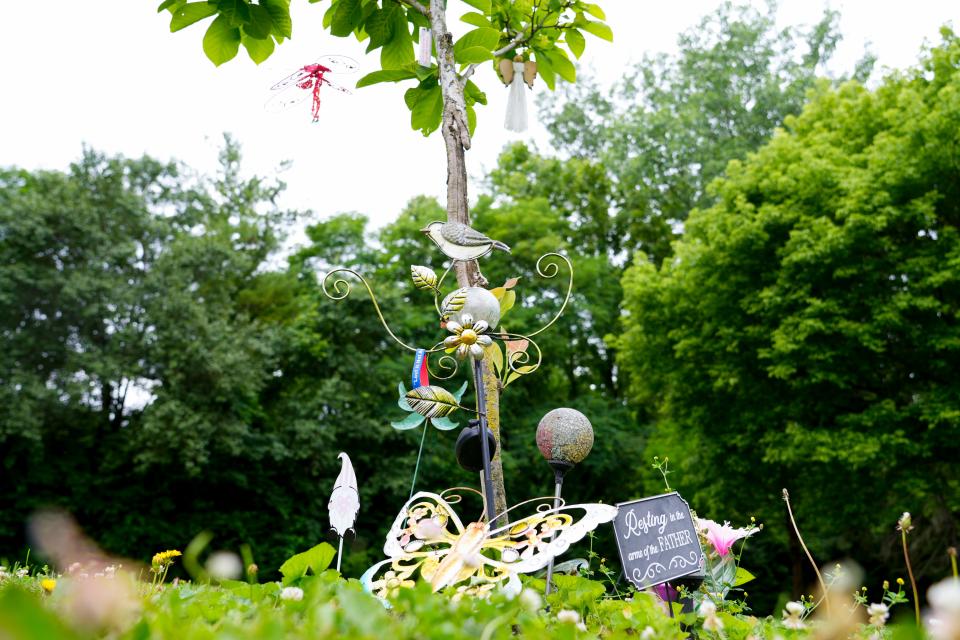DeSantis signs bill banning balloon releases in Florida. What's that mean for your next party?
- Oops!Something went wrong.Please try again later.
Balloons are often at the scene for major life events, such as birthday parties, weddings, marathons and celebrations of life. As fun and sentimental as they are, far too many end up as litter in the state’s ecosystems.
On Monday, Gov. Ron DeSantis signed into law a measure that would ban intentional balloon releases in the state, adding in some hefty fines for those who violate the law.
The Tallahassee Democrat wrote Florida's current law allows nine or fewer balloons to be released within a 24-hour period. However, this latest bill classifies the intentional release of all balloons inflated with a gas lighter than air as littering.
Oceana, a nonprofit ocean conservation organization, lobbied for the bill and stated the legislation's passage as a "great day for Florida's coastlines and ocean wildlife."
"Florida's new law will help save ocean animals from these preventable deaths," Oceana’s Florida Field Campaigns Manager Hunter Miller wrote in a statement. "While releasing balloons is sometimes used for celebrations, Floridians can opt for greener choices like bubbles, kites, planting trees, or making memorial gardens."
Intentional balloon releases in Florida: What is HB 321?
House Bill 321, dubbed the "Release of Balloons" bill, seeks to ban any intentional balloon releases in the state.
According to the bill's analysis, it revises the penalties for intentionally releasing balloons by specifying that a person commits littering if they intentionally release, organize the release of, or intentionally cause to be released balloons inflated with a gas that is lighter than air.
Weather, research and hot air balloons that are recovered after flight would still be allowed.
When will HB 321 take effect?
With DeSantis' signature, the bill would take effect on Monday, July 1.
Is there an exemption for biodegradable balloons?
Biodegradable balloons are often made from a natural latex, according to EcoFreak. However, the bill will remove the previous exemption for balloons that have been determined by FWC rules to be biodegradable or photodegradable.
What are the legal consequences of having a balloon release in Florida?
HB 321 would classify the intentional release of all balloons inflated with a gas lighter than air as littering, and people who violate the law could be subject to a $150 fine. Of that amount, $50 would go to the Florida Department of Environmental Protection's solid waste management trust fund.
For balloons over 15 pounds, fines could reach up to $1,000.
These penalties do not apply to children under 6, according to the bill.
How bad are balloons for the environment?

Nonprofit organization Oceana shared that scientists estimate that 33 billion pounds of plastic wash into the ocean every year, which equates to about two garbage trucks’ worth of plastic entering the ocean every minute.
Balloons are typically made of foil or latex and are inflated with a gas lighter than air. They are sealed with plastic ribbons, valves, tie-off discs, and clips. The bill's own analysis states when balloons are released, they drift away and eventually fall somewhere becoming litter, which can be dangerous to wildlife and the environment.
"Balloons take years to break down and often end up in waterways or the ocean, where they can be swallowed by marine animals. Turtles have been found to selectively eat burst balloons because they look like jellyfish, their natural food," the description reads.
Continuing: "Balloons, along with any ribbons or plastic discs attached, can harm animals by blocking their airways or becoming lodged in their intestines. Ribbons and strings from balloons can also become entangled round birds and other animals, making them unable to move."
In which states are balloon releases illegal?
In addition to Florida, several other states have passed or put forward legislation to ban or limit balloon releases outdoors, such as:
California
Connecticut
Delaware
Hawaii
Maine
Maryland
Rhode Island
Tennessee
Virginia
I was planning on doing a balloon release. What should I do instead?

Already have plans to hold a balloon release for an upcoming event this year? It's not too late to pivot. Party With a Cause shared some eco-friendly, easily cleaned up alternatives to the popular balloon releases, such as
Bubbles
Kites
Wish Papers
Wind Socks
Fabric Flag Bunting
Luminaries
(Biodegradable) Confetti toss
Powder canon
Pinwheels
Origami
Float flowers or candles
Natural boats
Plant a tree
Memorial garden
Contributing: Ana Goñi-Lessan, Tallahassee Democrat/USA TODAY Network-Florida
This article originally appeared on Fort Myers News-Press: Florida bill bans balloon releases. Info about HB 321

